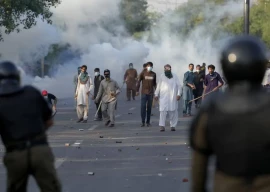
In the last decade, fewer and fewer candidates for the CSS (Central Superior Services) exam have passed the gruelling test to join the ranks of that elite layer of bureaucrats that runs Pakistan. Fifteen per cent of candidates qualified the written part in 2008 but only eight per cent could do so in 2009. This is a shame because if you pass the exam, you can provide at least three decades of what can be exceedingly rewarding public service.
Last year, about 12,000 people sat the test but only eight per cent of them qualified for 388 jobs. The number of people trying out for the government goes up each year but more and more candidates are failing. In fact, because the men and women from Sindh and Balochistan don't make it through their quota is handed over to people from the rest of the country. For example, last year only 37 people from Sindh passed the exam out of about 900 who qualified countrywide. Sindh had approximately 145 seats but only 37 got in. As a result, 108 seats went to successful candidates from the rest of the country.
Unfortunately, a lot of young people dismiss government service. They are worried about getting sucked into what they perceive as a wholly corrupt system. Indeed, there is corruption in the higher echelons of bureaucracy just as there are in any other field. However, on a closer look one will find that most corruption cases are reported against irregular and ex-cadre appointments and rarely CSS officers. There are many CSS officers who refuse to compromise their integrity and prefer postings on the sidelines. Most of them are scrupulously above-board like one officer who would not keep the official car after office hours and another bureaucrat, a former chairman of the FBR, who used to travel to Lahore in a Daewoo bus to be with his family.
When, who, how
The CSS exam is held regularly each year and a large number of people appear in it. The prestige and standard of this examination are challenging and require rigorous and sustained preparation.
The exam is held to recruit officers to grade 17 of the All Pakistan Unified Grades that go up to grade 22. The officers are slotted into 12 groups — Commerce and Trade, Customs and Excise, District Management Group, Foreign Service of Pakistan, Income Tax, Information Group, Military Land and Cantonments, Office Management, Pakistan Audit and Accounts Service, Police Service of Pakistan, Postal Group and Railways Group.
You have to be at least 21 years old and a maximum of 28 years old to sit the exam. You need a minimum of a second-class graduate degree of Pakistan or an equivalent foreign qualification. You are allowed to attempt the exam three times.
Successful candidates are allocated jobs on the basis of merit and provincial or regional quotas. They are: Merit (7.5 per cent), Punjab (including the Islamabad Capital Area) (50 per cent), Sindh (rural) (11.4 per cent), Sindh (urban) (7.6 per cent), Khyber-Pakhtunkhwa (11.5 per cent), Balochistan (6 per cent), Gilgit-Baltistan and FATA (4 per cent) and Azad Jammu and Kashmir (2 per cent).
Women have a 10 per cent and minorities a five per cent quota from the share of the provinces and regions, excluding the merit quota. The examination is held simultaneously in Islamabad, Lahore, Karachi, Peshawar, Quetta, Multan, Faisalabad, Gujranwala, Hyderabad, Sukkur, Abbottabad, D I Khan, Muzaffarabad and Skardu.
The exam
The examination is made up of a written part based on six compulsory and six optional subjects totalling 1,200 marks and a psychological test and viva voce carrying 300 marks. The usual aggregate for qualifying the examination is 50 per cent. If you pass, you are chosen for the groups according to your merit position, provincial quota and suitability requirements as determined by the Federal Public Service Commission (FPSC), the statutory body mandated to conduct this examination.
The written examination is usually held in February every year and its result comes out in or around the month of September. This is followed by psychological test, a viva voce and medical test.
The selected candidates become probationary officers and are sent to train at the Civil Service Academy in Lahore followed by departmental training.
The general trend is to take social science subjects dealing with history, politics, public administration and international relations because their subject material is similar to that of the compulsory subjects. Since graduates qualify to take the examination, the questions asked are commensurate with that level of qualification. Candidates need to answer in English, although the Islamiat paper can also be answered in Urdu.
The writer is a retired diplomat who has also held the post of Director-General at the Ministry of Foreign Affairs. He runs a training forum for CSS exam preparation.
Published in The Express Tribune, April 25th, 2011.




















1713973361-4/Destryed-Gaza-Historical-Sites-(1)1713973361-4-270x192.webp)









1713853507-0/MalalaHilary-(2)1713853507-0-270x192.webp)







COMMENTS (9)
Comments are moderated and generally will be posted if they are on-topic and not abusive.
For more information, please see our Comments FAQ